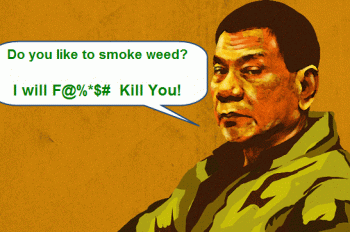
CNN Says that if you smoke weed you’ll have higher hospital bills!
I wish I was making this up, but the latest “research” by “scientists” who are definitely not funded by the pharmaceutical industry and have absolutely no conflict of interests whatsoever, “found” that people with “cannabis use disorder” (the pharmacological term for Weed Smoker) took longer to recover post surgery and also had higher bills because of how much weed allegedly destroys their recovery process.
What’s more, a whopping 30% of people who smoke weed will develop CUD. Facts, people…facts!
And before continue with the rest of this article, I’d like to invite you to internalize the tone of sarcasm I’ll insert into this piece because tearing apart Reefer Madness is therapeutic for me.
So first, let’s summarize the article published on CNN’s website.
“Overuse of marijuana use linked to complications and DEATH study finds…”
With a headline like that, how couldn’t you read the article. When you do, you’ll notice a lot of your typical reefer madness techniques, using “science” and its power to convince you that smoking weed is indeed bad for you.
But to spare you the suffering, I’ve summarized the article in bullet points below:
-
A new study suggests that clinical overuse of marijuana is associated with complications after major elective surgery.
-
Smoking marijuana can impact blood flow, respiration, body temperature, and contribute to airway blockages, potentially making recovery from surgery more difficult.
-
The study found that patients with cannabis use disorder had a higher risk of complications, such as blockages of coronary arteries, stroke, kidney injury, blood clots, breathing difficulties, infection, and in-hospital death.
-
Patients with cannabis use disorder also had longer hospital stays and higher hospital bills compared to those without the disorder.
-
The study highlights the importance of preoperative screening for cannabis use disorder in the context of increasing cannabis use rates.
Now it’s true, cannabis users do have a higher tolerance for anesthesia. Therefore, if you’re doing any major surgery, it’s probably best to explain that you do smoke weed and more or less how much.
It’s better for people to think “Look at this stoner” than for you to not be under enough when there’s a bunch of masked butchers cutting into your body.
But I want to point out specific things in this article that I think people need to become aware of. It’s the techniques on how they (probably the pharmaceutical companies) utilize certain wording to push ideas into your mind. These ideas then eventually become internalized and turn into beliefs.
How to create beliefs…
In the article in CNN there were Four Major techniques being utilized to get their “message” into your mind and past your filters.
Fear-mongering:
In the realm of “persuasive writing”, fear-mongering is a tactic often employed to sway opinions or behaviors by accentuating the most extreme outcomes. In the case of the article you shared, the emphasis on complications after surgery linked to the clinical overuse of marijuana seems to follow this pattern. By prominently highlighting severe consequences such as blood clots, stroke, breathing difficulties, kidney issues, and even death, the intention may be to create a sense of alarm and discourage marijuana use.
While it's important to consider potential risks associated with any substance or activity, it's equally crucial to approach information with a discerning eye. Fear-based narratives can sometimes amplify the negative aspects while downplaying potential benefits or providing a balanced perspective. It is essential to seek reliable, evidence-based research that presents a comprehensive view, weighing both potential risks and benefits.
By approaching discussions on cannabis use in a well-informed and balanced manner, we can foster a more productive dialogue that enables individuals to make informed decisions based on their unique circumstances and preferences. Remember, knowledge empowers us to navigate complex topics with confidence and make choices that align with our personal well-being.
Selective use of research:
When examining a topic as multifaceted as marijuana, it is important to consider a wide range of research and perspectives. However, the article you shared appears to selectively reference studies that support negative claims about marijuana, potentially presenting an imbalanced perspective. This cherry-picking of studies can be misleading and limit a comprehensive understanding of the subject.
By focusing solely on studies that highlight the impact of marijuana on blood flow, respiration, body temperature, airway blockages, blood pressure, and heart rate, the article may inadvertently exclude other research that explores potential benefits or presents a more nuanced view. This approach can create a skewed perception, failing to capture the full picture of marijuana's effects.
To develop a well-rounded understanding, it is crucial to explore diverse sources and consider a range of studies that examine both positive and negative aspects. This enables us to form informed opinions based on a broader foundation of evidence, fostering a more accurate and balanced understanding of the topic at hand. By critically evaluating research and seeking a comprehensive perspective, we can engage in more informed discussions and make decisions that align with our individual needs and values.
Associating marijuana use with disorder and addiction:
Within the context of discussing marijuana use, it is important to approach the topic with a nuanced understanding. The article repeatedly mentions cannabis use disorder and addiction, highlighting dependence and negative withdrawal symptoms.
By consistently emphasizing these aspects, the article may seek to create a negative perception of marijuana use, suggesting that it leads to problematic behaviors and interferes with daily life.
While it is true that some individuals may experience dependence or addiction in relation to marijuana use, it is important to recognize that this is not the case for everyone.
The portrayal of marijuana use solely in terms of disorder and addiction can oversimplify a complex issue and disregard the experiences of responsible and moderate users.
It is crucial to acknowledge that marijuana affects individuals differently and that patterns of use can vary widely. Many people incorporate marijuana into their lives responsibly and without experiencing significant negative consequences.
By understanding the full spectrum of experiences and considering a range of perspectives, we can foster a more informed and balanced conversation surrounding marijuana use, avoiding stigmatization and embracing a more comprehensive understanding of its potential effects.
And this is essentially what we all want, to simply be treated as any other drug user, whether they smoke cigarettes or drink beer.
Statistical manipulation:
In the world of research and statistics, it is crucial to interpret data with caution and a discerning eye. The article you shared appears to highlight a slightly higher risk for complications in patients with cannabis use disorder, describing it as significant. However, it is essential to examine the actual difference in risk percentages to gain a comprehensive understanding.
Sometimes, companies or individuals may manipulate statistical data to suit a particular narrative or agenda. This practice, known as "lying with numbers," is not uncommon and can be observed in various fields, including the drug war and even recent cases like Pfizer's payment of one of the largest criminal fines for off-label promotion.
By magnifying the significance of a relatively small difference in risk percentages, the article may be employing a technique that could potentially distort the true impact of cannabis use disorder on surgical complications. It is crucial to critically evaluate statistical claims and consider the context, sample size, and potential biases within the research.
When encountering statistical information, it is important to delve deeper, seek multiple sources, and explore a range of perspectives. This approach enables us to form a more informed understanding, ensuring that statistical manipulation does not lead us astray. By examining the numbers with scrutiny, we can uncover the truth behind the data and make more sound judgments based on reliable evidence.
Propaganda is alive and well – and you don’t know who to trust!
In the complexity of modern times, propaganda remains an ever-present phenomenon.
It can be found in various forms, from media articles and advertisements to political campaigns and social media.
The challenge lies in discerning which sources to trust and navigating the vast sea of information with critical thinking and vigilance.
Practical ways to spot propaganda involve being mindful of certain indicators.
Firstly, consider the presence of emotional manipulation, such as fear, anger, or excessive sentimentality, which can be used to evoke strong reactions and cloud judgment. Look out for cherry-picked evidence, where only selective information is presented to support a particular viewpoint, while opposing evidence is ignored or downplayed. Additionally, be cautious of sweeping generalizations and the use of loaded language that aims to influence opinions rather than provide objective information.
Maintaining a sense of mindfulness and skepticism is crucial in today's media-saturated society. It is essential to question, fact-check, and seek out multiple perspectives before forming opinions or making decisions.
Critical thinking skills, such as analyzing sources, cross-referencing information, and consulting reputable experts, can help uncover the truth amidst the noise of propaganda.
By remaining vigilant and aware of the potential presence of propaganda, we empower ourselves to think independently and make informed choices. It is important to recognize that everyone has biases, including ourselves, and to approach information with an open mind.
Being mindful of our own beliefs and the influence of external messages allows us to navigate the complexities of the modern world with greater clarity and discernment.
In a world where misinformation and manipulation can shape perceptions and decisions, cultivating a critical and discerning mindset is vital.
By arming ourselves with knowledge, skepticism, and a commitment to truth-seeking, we can navigate the vast landscape of information and guard against the influence of propaganda, ensuring that our thoughts and actions are guided by our own judgment and values.
And I think this is an essential element to which I hope all cannabis enthusiasts can adapt - a never ending quest for truth. I know that by researching cannabis I uncovered so much shady stuff, it made me reevaluate my whole relationship with the authorities and reexamine my level of blind trust towards the government.
I encourage you all to question those you trust, and to truly put them to the test.
Think freely!







